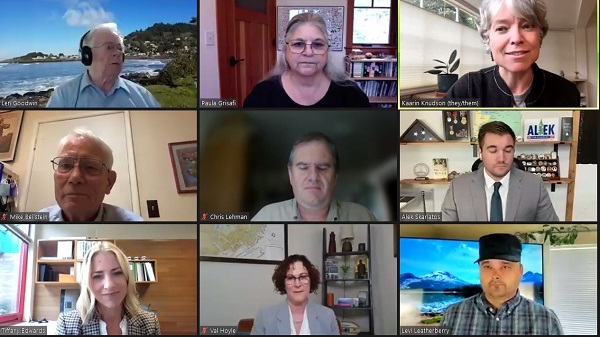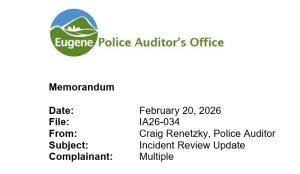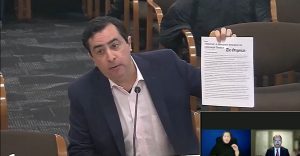Meet the candidate: Mike Beilstein for CD4
13 min read
Candidates for the Fourth Congressional District participated in a candidate forum Oct. 6. Here is Pacific Green Party candidate Mike Beilstein.
[00:00:08] Mike Beilstein: I want to thank the Eugene and Springfield City Clubs and League of Women Voters for this opportunity to be seen and heard by voters. I’m a long-time member of League of Women Voters and I consider it a bulwark of protecting democracy. I’ve been a member of City Club of Corvallis since its inception, so I’m a supporter of these organizations.
[00:00:27] As a third-party candidate, you might question my participation in the election. You’re welcome to think of me not as a third-party, but as an anti-party candidate. The two major parties, Democrats and Republicans, have a lock on political power, but they’re just two brands of the same political product.
[00:00:43] The owners of the finance industry—that includes banking, Wall Street, insurance, and real estate—the fossil fuel industry, and the arms industry are the controllers of political power in this country, and they control the policies which the Democrats and Republicans can implement through legislation and executive action.
[00:01:02] The Green Party represents the opposition to the control of political power by the oligarchs and finance, fossil fuels, and war-making. The Green Party represents the values of people, planet, and peace.
[00:01:13] If you want universal access to quality healthcare; if you want a living wage for all workers; if you want an immigration system that doesn’t create an underclass of exploited slave laborers; if you want access to elected officials that doesn’t require a $100,000 campaign contribution;
[00:01:30] If you want free tuition for preschool through graduate school and an end to crippling student debt; if you want to transition to clean energy and a post-carbon economy; if you want a balanced federal budget that isn’t bloated by arms spending, that only makes the world a more dangerous place;
[00:01:46] If you want to divert the country from the disastrous course towards global war and climate chaos, then vote Green. Register as a Green voter and get involved in organizations that hound elected officials to act for the world of people rather than for the protection of the wealthy.
[00:02:02] Thank you.
[00:02:02] John Q: Interviewing candidates from our local award-winning public radio station, KLCC, Chris Lehman.
[00:02:09] Chris Lehman: How would you sum up Peter DeFazio’s time in office?
[00:02:12] Mike Beilstein: I was on the same ballot with Peter DeFazio five times, so I know him very well— and consider him a friend. I think of all the progressive Democrats in Congress, he’s one of the best. But at the same time, it took a lot of pressure on him to get him to finally support the Medicare for All bill.
[00:02:31] I think he continued to vote for military spending at times when I thought he shouldn’t have. And his infrastructure was always concerned with expanding the transportation system that we have now, which I think is kind of a dead end. We need electrification of transportation, both rail and automobile.
[00:02:49] And so I have a lot of admiration for Peter DeFazio, and I’m sorry I’m not running against him again.
[00:02:54] Chris Lehman: The Washington Post today reported that nearly 300 so-called election deniers are on the ballot this fall. Can you state without equivocation who won the 2020 presidential election? And what if anything should be done to bolster Americans’ confidence in the electoral process?
[00:03:11] Mike Beilstein: I have no doubt that Biden won the 2020 election. As far as improving democracy, I think, you know, one thing the Green Party has supported for long time is Ranked Choice Voting.
[00:03:22] I think that would help to ensure that whoever’s elected has majority support, so that’s something that I think would help. I think also getting the money out of political campaigns would restore people’s faith in it. Right now, people win elections based on their bank accounts, not on the policies or their personal virtues.
[00:03:39] Chris Lehman: Republican Sen. Lindsey Graham introduced a bill that would ban most abortions after 15 weeks of pregnancy nationwide. Would you vote for Graham’s bill?
[00:03:48] Mike Beilstein: I think Graham’s bill has no chance of passing even if the Republicans get a majority in the House in this election, which I don’t expect is going to happen.
[00:03:58] And I think it was a matter of virtue signaling. It’s for the benefit of those who want to make abortion an issue and think that they can gain votes by this rather unpopular approach of banning abortions. Certainly I support the rights of women and all people to get the medical care that they need on the basis of their own desires and their health care providers.
[00:04:20] Chris Lehman: Mike, what approaches do you advocate for, to ensure that Americans have access to affordable quality healthcare?
[00:04:28] Mike Beilstein: I’ve supported the Medicare for All approach for more than 20 years. I’ve worked with the Mid-Valley Healthcare Advocates and Healthcare For All Oregon to try to establish a statewide single-payer system.
[00:04:40] I would actually prefer a socialized medicine program as they have in Cuba or Britain, but I think the public would more easily adapt to the single-payer approach.
[00:04:51] A good way to achieve single-payer would be just to take Medicare and reduce the age requirement in a gradual way. So maybe each year we reduce it by another year. People could enter at 64 and then next year at 63 and 62. So I think that would be a great approach to bringing about health care for all in this country.
[00:05:10] Chris Lehman: How do you plan to address the housing and homelessness crisis across Oregon?
[00:05:15] Mike Beilstein: Yeah, I think a big problem with housing in general is it’s treated as an investment rather than as a utility. The cost of housing continues to go up—whether you’re purchasing a house or renting—much, much more rapidly than wages in this country.
[00:05:30] And so that’s pushed people, who were desperate at the bottom, who are barely hanging onto housing. They’re pushed into homelessness. So I think that’s the issue. I think that to take the finance aspect out of housing would be a good way to start increasing availability of housing to everyone.
[00:05:47] And public housing where it exists has worked very well in, in percent of homes are either public, they’re publicly owned or they are in cooperatives. And I think this idea of public housing, I think our government agencies at all levels should be investing in housing, which is kept out of the financial market because it’s public.
[00:06:06] Chris Lehman: Would you support a bill that would require candidates for president and vice president to release copies of their tax returns?
[00:06:13] Mike Beilstein: I’m fully in favor. This was never an issue before Donald Trump and Donald Trump, you know, basically used this failure to disclose his tax returns as to cover up criminal activity. It was not an issue in the past, but it certainly has become an issue with Donald Trump. So I think a law requiring disclosure would be very useful to the country and expose people like Trump.
[00:06:35] Chris Lehman: Would you vote to continue this child expanded child tax credit? And what other tools should the federal government use to fight child poverty?
[00:06:43] Mike Beilstein: I think something we’ve observed, or, people who looked at it closely is, one of the best ways to eliminate poverty is to give people money. That’s the only real way you can eliminate poverty. And I think the child tax credit did that. It gave money to people who needed it.
[00:06:57] And it resulted in a reduction in poverty and poverty amongst children especially. So definitely I would support continuing or reintroducing this expanded child tax credit and other things such as healthcare for children and I would ultimately support a universal basic income.
[00:07:14] I think income and security of access to the necessities of life is far more important than the access to work. So I certainly would support this continuation expansion of child tax credit. Thank you.
[00:07:29] Chris Lehman: How would you help our local economy recover from the effects of the coronavirus?
[00:07:34] Mike Beilstein: I think access to services— access to the necessities of life—is more important than access to work. I think we have to adopt a new attitude towards work, partly because of the environmental degradation that’s occurred through expanding work.
[00:07:49] I think this emphasis on jobs is inappropriate. We could have more jobs that people should be working less. I think work ultimately comes down to taking available resources and turning it into garbage and landfill. And I think the less of that we do, the better we need to meet the necessities of life, but we don’t need to be constantly expanding our use of resources, which is what economic growth is consists of. So I think this new attitude towards work has to be something we have to worry about meeting people’s needs rather than meeting their need to destroy the environment.
[00:08:24] John Q: At a recent candidate forum for CD4, Pacific Green Party candidate Mike Beilstein is interviewed by KLCC’s Chris Lehman.
[00:08:32] Chris Lehman: And turning now to foreign policy. Russia’s invasion of Ukraine has been widely condemned. What role, if any, should the United States play?
[00:08:41] Mike Beilstein: I guess I’ll preface this by saying, it’s clear that the invasion of the Ukraine was a war crime. I’m not going to try to excuse Russia on this. However, I would not say that it was unprovoked. Since 2014, the United States has supported a war against the breakaway regions in the Donbas that killed over 14,000 people prior to this Russian push to end this by forcing Ukraine and there’s an expansion of military activity in the Donbas that provoked the Russians into this. And the thoughts of possibly Ukraine joining NATO.
[00:09:15] Very soon after the war had started, there were negotiations between Ukraine and Russia, which would have led to a peace at an early stage. The United States and Britain stepped in diplomatically and told the Ukrainians, ‘No, you, you can’t do this.’ And it is a proxy war. The United States is at war there. It’s just we’re killing Ukrainians and Russians instead of Americans.
[00:09:37] Chris Lehman: How do you end the epidemic of violence against women as well as sexual assault and sexual harassment?
[00:09:43] Mike Beilstein: I think more attention needs to be brought to this. I agree that it is a systemic problem, but it’s not a systemic problem specifically against women. It’s a systemic attack on the working class of this country. Increasing opportunities for women and their ability to leave a situation of abuse, economic disadvantage that women are under now, I think all these things need to be worked on, but certainly education and economic opportunity for women and attention of law enforcement to the issue, can provide some help. But we have a patriarchal culture and I think it’s going to take a long time to overcome that. But we can start by empowering women where we can.
[00:10:22] Chris Lehman: The U.S. Customs and Border Protection reported 203,000 quote ‘encounters,’ an average of more than 6,500 every single day. What is your reaction to those numbers, and secondly, what proposals do you have related to the current immigration system?
[00:10:39] Mike Beilstein: I think the United States is creating this crisis through the poverty and the warfare that we have supported in Latin America especially. And climate change now. So it’s not something that we didn’t create ourselves.
[00:10:52] It’s not the poor governments of Guatemala or El Salvador. It’s how the United States has interfered in those governments that is creating this crisis. I think the United States needs a clear path for hearing asylum cases. I think that the idea of having to wait over a year until an asylum case is heard is unforgivable. We need to beef up the resources to deal with that.
[00:11:12] And we need to be planning on integrating these people into the U.S. economy. I think this great shortage of workers could be solved by immigration. That’s how we’ve solved labor shortages in the past.
[00:11:23] Chris Lehman: Our next question will first go to Mike Beilstein. Wildfires are an annual presence. What role, if any, should the federal government play in forest management?
[00:11:32] Mike Beilstein: I think we’ve come to realize that fires, wildfires are a natural part of the ecosystem we live in. And I think we have to manage to live with that.
[00:11:42] We need to reduce the danger to inhabited areas by wildfire and we need to use managed fires to reduce the damage of big, gigantic fires. I think overall the federal government should be encouraging or forcing people to go to protect old-growth forest and to manage tree farms and going to a longer rotation period.
[00:12:05] I think because of the issue of carbon sequestration and forest, we should not be cutting any trees that are less than 80 years old. And the tree farms tend to exacerbate the problem of wildfires rather than end those problems.
[00:12:19] Chris Lehman: If elected, what specific policies and legislation will you advocate to reduce our country’s greenhouse gas and methane emissions, freeze construction of new coal-fired power plants, and invest in a new clean energy economy?
[00:12:33] Mike Beilstein: I’ve been a long-time supporter of Citizens Climate Lobby, and I won’t say a lot about it except that it’s promoting a program of carbon fee and dividend where carbon or fossil fuels are taxed at their point of entering the economy, either at mine or wellhead, or at ports where they’re brought in. And then that tax is returned on a per capita basis to citizens.
[00:12:57] So this is an economic fix I think could have a lot of benefit, although it won’t solve the problem entirely—the Inflation Reduction Act— although it makes bigger investments in clean energy than we’ve had at any time in the past. It also expands or guarantees an expansion of lease options for fossil fuels from federal land. So it’s kind of like nothing positive has been done about climate or any environmental issues without giving some benefit to the fossil fuel industry along with it. And so I think the main thing is we’ve got to stop using fossil fuels.
[00:13:32] Chris Lehman: Measure 114 on the Oregon ballot this year would create a permit system for the purchase of firearms and would also place limits on so-called high-capacity ammunition magazines. What, if any, proposals do you have for gun regulation at the federal level?
[00:13:48] Mike Beilstein: I’ll vote for 114. I don’t think it’s enough. I think on the federal level we probably need a new Supreme Court if we’re going to have effective gun laws that will reduce violence.
[00:13:58] A big problem is the failure to go after the manufacturers and the retailers of weapons. They should be held responsible, but they’re protected right now by, by federal law.
[00:14:09] I think the Supreme Court has not paid attention to the Second Amendment which starts out with the reference to ‘a well-regulated militia.’ And I think that there’s nothing in the Constitution which prevents gun laws, which would actually protect the public. But the Supreme Court has chosen to interpret this as an inalienable right, to own what weapons you want to have. And I don’t think it is a real right that’s protected by the Constitution.
[00:14:33] Chris Lehman: Do you support granting statehood to the District of Columbia?
[00:14:38] Mike Beilstein: I support statehood for Washington D.C. and I guess I’d support statehood for these territories as well. I think that it’s unfair that citizens of Washington D.C, Puerto Rico don’t have the full rights of citizenship, the ability to participate in elections. Yeah. I’m for statehood for D.C.
[00:14:56] Chris Lehman: Closing statement from Mike Beilstein.
[00:14:58] Mike Beilstein: This is my opportunity to tell you why you should vote for me, or maybe why you should not vote for me. I liked the quote from Emma Goldman who said, ‘If we could change anything by voting, it would be illegal.’ And I don’t want to discourage anyone from voting, but I believe there’s more to democracy than just filling out a ballot every few years.
[00:15:17] Emma Goldman was emphasizing that progressive change only comes from mass organizing. We have the 40-hour work week, child labor laws, and equal rights for women— almost— because of mass organizing by the trade unions. And Jim Crow in the South ended because of demonstrations led by heroes like Martin Luther King, John Lewis, and Malcolm X.
[00:15:38] The war against Vietnam ended because of the student- and veteran-led mass protests. My political activity started in response to the first Gulf War. I was sick in that the United States cut off all possibility of a negotiated settlement and instead started bombing Iraq, and then continued to bomb Iraq for the next 12 years while imposing sanctions responsible for the death of a half a million Iraqi children.
[00:16:01] Then from anti-war organizing, I branched out to other political activity. I was elected to the Corvallis City Council through my activity in the Corvallis Living Wage campaign. Since 1995, I worked with Healthcare for All Oregon and I’m still working to achieve universal single-payer health care.
[00:16:18] I worked on the campaign for ranked choice voting for Benton County commissioners, which succeeded in this year. For the first time, Corvallis city councilors and mayor will be elected by Ranked Choice Voting. I worked on many campaigns that were not 100% successful, and I’ll continue to oppose the militarism that enriches billionaires by vacuuming resources from nature and from workers and impoverishes this country and endangers the world.
[00:16:43] A Green vote means that you are on the side of social justice, environmental wisdom, democracy, and non-violence. Your Green vote may be a protest, but is a step towards building the mass movement that can save our country from the horrors of global war and climate chaos. Never miss an opportunity to vote Green.
[00:17:01] John Q: Running to succeed Peter DeFazio, that was Green Party candidate Mike Beilstein. The League of Women Voters, Eugene and Springfield City Clubs and KLCC’s Chris Lehman interviewed the candidates.





